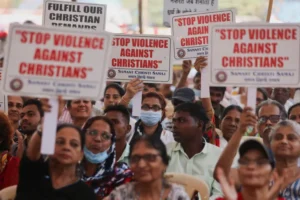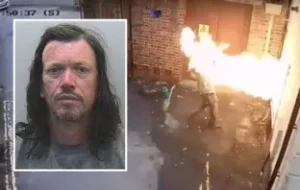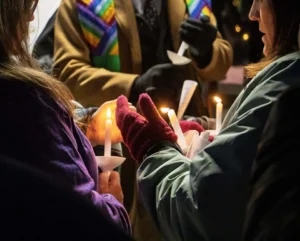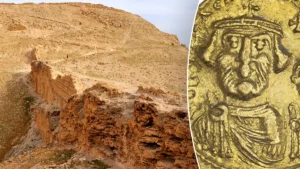US Senator Proposes Trump for Pope: The Controversy and Challenges Ahead
Introduction: The Unlikely Suggestion
Recently, a U.S. senator sparked widespread astonishment by proposing that former President Donald Trump be considered for the papacy. This unprecedented suggestion has captured the attention of both political enthusiasts and religious commentators alike, leading to intense discussions regarding the implications of such a candidacy. While the position of Pope is typically reserved for those within the Catholic faith and usually comes from a background of deep theological training and ecclesiastical experience, the senator’s provocative statement serves as a reflection of the current political climate in the United States, where unconventional ideas often gain traction.
The senator, noted for his audacious and often divisive rhetoric, seems to be capitalizing on Trump’s significant support base. By bringing the former president into a religious context, the senator positions himself as a forward-thinking political figure, willing to challenge established norms. This proposal can be interpreted not only as an attention-grabbing headline but also as a commentary on the merging of politics and religion in contemporary discourse.
Trump, a polarizing figure characterized by his brash communication style and policies, has never shied away from the spotlight. While the notion of a former president ascending to the position of Pope may seem far-fetched to many, it unveils deeper questions about the integration of political identities into religious roles. As this scenario is discussed, it simultaneously reveals the underlying motivations of the senator, who may be seeking to bolster his own political career or capitalize on Trump’s enduring influence on the American electorate.
In a society that often blurs the boundaries between politics and religion, this surprising proposal is sure to ignite debates and draw critiques, raising essential questions about the criteria and qualifications needed for such a revered title as the Pope. The discussion surrounding this unlikely suggestion is just beginning, with potential implications reaching far beyond the initial statement itself.
The Senator’s Perspective: Why Trump for Pope?
In an unprecedented move that has garnered significant attention, a U.S. senator has proposed Donald Trump for the papacy, presenting a unique perspective on leadership, faith, and political strategy. The senator’s endorsement appears to be rooted in a belief that Trump embodies a robust leadership style that could resonate within the Catholic Church. Drawing from his previous experiences in both business and politics, Trump has demonstrated a brand of assertiveness and a direct approach that some believe could invigorate the church’s leadership at a time when it faces numerous challenges.
From the senator’s standpoint, Trump’s purported alignment with certain core Catholic teachings is also a compelling factor. The senator emphasizes Trump’s focus on family values, patriotism, and a strong stance on various moral issues, suggesting that these traits could reinforce the church’s mission to serve its global congregation. Moreover, the senator points to Trump’s ability to galvanize a base of support, which could be seen as essential in fostering engagement among younger Catholics who may feel disconnected from traditional church frameworks.
Additionally, there is an underlying political strategy to the endorsement. By positioning Trump as a contender for the papacy, the senator potentially aims to redirect the conversation around Trump’s polarizing public persona. Instead of focusing on his controversial political history, portraying him as a candidate for spiritual leadership might soften perceptions and open avenues for dialogue among diverse groups, including those critical of Trump. Ultimately, the senator’s advocacy for Trump’s candidacy has sparked a conversation about the intersection of faith and politics, challenging conventional notions of who can ascend to the papacy and what characteristics should define its holder.
Public Reaction: Support and Backlash
The proposal by a U.S. Senator to nominate former President Donald Trump for the papacy has sparked a notable division in public opinion and political discourse. Supporters of this unconventional idea argue that Trump could serve as a unifying figure for conservative Catholics, leveraging his significant influence and popularity in certain circles. They emphasize that Trump’s outspoken approach and fervent advocacy for traditional family values resonate with many within the Catholic community, who may feel marginalized in contemporary discussions around social issues. For these supporters, Trump’s potential papacy symbolizes a bold stance against what they perceive as the secularization of the Church and a return to its foundational beliefs.
In contrast, the proposal has drawn considerable criticism from various quarters, with opponents deeming it not only absurd but also emblematic of political opportunism. Detractors argue that an individual with Trump’s contentious history—including his polarizing rhetoric and divisive political strategies—would be an inappropriate choice for a spiritual leader who is expected to promote peace, compassion, and unity. Many critics highlight the stark contradictions between Trump’s policies and the teachings of the Catholic Church, particularly on issues such as immigration, social equity, and environmental stewardship. Furthermore, they contend that the idea trivializes the sanctity of the papacy by associating it with partisan politics and celebrity culture.
This schism in public reaction illustrates not only the complexities of contemporary political dynamics but also the evolving role of religious institutions in society. As the conversation evolves, it remains to be seen how both supporters and opponents will articulate their perspectives as the discussion around Trump’s proposed nomination continues to unfold. The implications of such a nomination could potentially reshape the landscape of Catholicism in the United States, provoking deeper inquiry into what leadership in the Church truly represents.
The Papacy: Understanding the Requirements
The position of Pope, as the leader of the Roman Catholic Church, carries with it a substantial set of responsibilities and expectations. Traditionally, the requirements for becoming Pope include not only being a male member of the clergy, preferably a cardinal, but also possessing a deep understanding of Church doctrine, moral integrity, and spiritual leadership. The Pope is viewed as the successor to Saint Peter, providing a direct link to the foundational aspects of the Church’s history and teachings.
The process of electing a Pope is conducted through a conclave—a gathering of the College of Cardinals, which typically convenes following the death or resignation of a sitting Pope. During this conclave, cardinals participate in a series of secret ballots to select the new leader. A candidate must receive a two-thirds majority to be elected, which illustrates the significant consensus needed to assume such a pivotal role within the global Church. It’s noteworthy that while any baptized male can theoretically be elected, practical considerations limit the field predominantly to cardinals within the Church, who have demonstrated theological acumen and exemplary moral character.
In addition to adhering to these qualifications and procedural norms, the Pope is expected to provide moral and spiritual guidance not only to the Vatican but also to Catholics worldwide. This role entails championing values such as compassion, humility, and integrity. Given this high standard of expectation, the potential nomination of Donald Trump as Pope raises considerable debate. While Trump has garnered a substantial following, his public persona and previous actions may challenge the conventional virtues associated with papal leadership. The juxtaposition of Trump’s candidacy with the established requirements of the Papacy invites further exploration about the implications of such an unprecedented suggestion within the fabric of the Catholic hierarchy.
Trump’s Relationship with the Catholic Church
Donald Trump’s relationship with the Catholic Church is multifaceted, shaped by his interactions with key religious leaders, the policies of his administration, and his own statements concerning faith. Throughout his presidency, Trump engaged with a variety of religious figures, including prominent bishops and archbishops, some of whom supported his initiatives. Notably, he received vocal backing from Cardinal Timothy Dolan of New York, who praised Trump’s commitment to issues such as religious freedom and pro-life policies. However, this support was not universal within the Catholic community, as some clerics and laity criticized his approach to immigration and social issues, suggesting it contradicted the Church’s teachings on compassion and inclusivity.
Trump’s policies during his presidency also had significant implications for Catholic communities. His administration’s stance on immigration, particularly the support for stricter border controls and the travel ban affecting several Muslim-majority countries, has drawn rebuke from various Catholic leaders, who emphasized the Church’s mission to serve migrants. Furthermore, his approach to healthcare and social welfare programs raised questions about the support for the vulnerable, which is a cornerstone of Catholic social teaching. Policies that favored wealthier sectors of society were seen by critics as inconsistent with the Church’s advocacy for the marginalized.
In terms of his personal faith, Trump frequently made references to God and expressed reverence for the religious community; yet, many have questioned the depth and sincerity of his beliefs. His somewhat ambiguous statements regarding his own faith background—being raised in a Protestant environment yet making overtures to Catholic traditions—have sparked debate about his genuine connection to the Catholic faith. This assessment of Trump’s history with the Catholic Church provides essential context against which his candidacy for the papacy can be evaluated, highlighting both the support and challenges he would face in such a role.
Political Implications: Capitalizing on Religion
The recent proposal of Donald Trump for the papacy by a US senator has stirred considerable discussion regarding its political implications. By associating Trump’s name with such a prominent religious figure, one could argue that it seeks to merge the domains of politics and religion in a unique manner. This intersection raises questions about the future dynamics of Trump’s political career and the Republican Party as a whole.
Firstly, it is essential to understand how this proposal might enhance or diminish Trump’s standing among his supporters. Many of Trump’s followers are characterized by their strong religious beliefs, particularly within the evangelical community. Aligning him with a position traditionally held with reverence could potentially bolster his appeal among those voters. However, the proposal also risks alienating moderate Republicans and independent voters, who might view the merger of political and religious identities as problematic. This duality underscores the fine line Trump must navigate to maintain his existing support base while potentially expanding it.
Additionally, the idea of Trump as a candidate for the papacy beckons critical implications for the Republican Party’s approach to religion and politics. Throughout recent years, the party has strategically utilized religious affiliations to galvanize support, but endorsing a figure like Trump for such a role could signal a deeper entrenchment in faith-based political strategies. This could lead to ideological shifts within the party, prompting debates about the appropriateness of blending governance with religious leadership. Such discussions are vital for the party, as they will influence its platform and voter outreach moving forward.
In conclusion, the suggestion of Donald Trump as a papal candidate encompasses complex political implications, including electoral strategies and the broader relationship between faith and politics. The unfolding reactions will undoubtedly shape not only Trump’s future endeavours but also the evolving landscape of the Republican Party.
Cultural Context: The Role of Religion in Politics
The intersection of religion and politics has been a defining feature of the political landscape in the United States, influencing various aspects of governance and public policy. Historically, religious beliefs have played a crucial role in shaping the moral and ethical frameworks that underpin political discourse. Figures such as Martin Luther King Jr. utilized religious platforms to advocate for civil rights, demonstrating the potential of faith to inspire significant societal change. This trend has persisted, with many politicians today seeking alignment with religious groups to bolster their appeal among certain voter demographics.
The role of Christianity, in particular, has been a focal point in American politics. Many politicians, including Donald Trump, have strategically leveraged their association with Christian values to enhance their political identity. Trump’s appeal to white evangelical voters is a testament to how religious affiliation can impact electoral outcomes. His proclamation of upholding Christian values has resonated with a segment of the population that perceives threats to these values from secular governance. This synergy between political aspirations and religious identity underscores the importance of faith in driving political engagement and influencing voter behavior.
However, the intertwining of religion and politics is not without its challenges. Critics argue that the politicization of religious beliefs can lead to divisiveness and conflict, as differing interpretations of faith may clash in the public arena. Further, the endorsement of a political figure by religious leaders can raise concerns regarding the separation of church and state, an integral principle in American governance. The proposed idea of Donald Trump being nominated for a papal position illustrates the complexities surrounding the interplay of religion in political contexts, highlighting both the potential for unification among believers and the divisions it may create within the wider community.
Legal and Theological Challenges
The proposal put forth by a U.S. senator to nominate former President Donald Trump for the papacy raises a host of significant legal and theological challenges that warrant a thorough analysis. According to canonical law, specifically the Code of Canon Law, the requirements for papal eligibility dictate that the individual must be a baptized male, which Trump satisfies. However, the implications of nominating a figure who has been actively involved in the contentious world of politics must be carefully scrutinized.
One of the primary legal challenges stems from the principle of church and state separation, which is critical in many societies, including the United States. The potential election of a politically active individual to a religious leadership role could blur the lines between political advocacy and spiritual guidance, raising concerns about the Church’s independence from governmental influence. This could lead to questions regarding the Church’s integrity and its ability to maintain a neutral stance on political issues, potentially alienating millions of its followers who may hold diverse political views.
Theologically, the papacy has historically been viewed as a position that requires a profound commitment to spiritual matters rather than political affiliations. The Pope is expected to prioritize pastoral care, preaching, and guiding the faithful in their spiritual journeys over engaging in political discourse. A figure like Trump, who is recognized for his contentious and polarizing political strategies, might pose a challenge to this expectation. His previous political actions could lead to skepticism among segments of the Catholic community about the Church’s mission and focus. This predicament underscores the necessity for a leader who embodies the core values of the Church, which may conflict with the attributes associated with a political figure.
In summary, the critical examination of the senator’s proposal reveals complex legal and theological challenges that complicate the potential nomination of Donald Trump as Pope, emphasizing the ramifications such a decision could carry for the Catholic Church and its followers.
Conclusion: The Future of Religious Leadership
The proposition made by a US senator to nominate Donald Trump as Pope has sparked a multitude of discussions surrounding the future of religious leadership and its interplay with political dynamics. This unusual suggestion raises critical questions about the role of the Catholic Church and how it navigates the increasingly complex landscape of modern governance and societal expectations. In a time where the influence of politics on religion remains a constant subject of debate, the implications of such a nomination could be profound.
One of the primary concerns is the potential for the Catholic Church to become further politicized. This tension between religious authority and political ambition may complicate the Church’s mission, diverting attention from spiritual guidance to partisan agendas. The sanctity of religious leadership could be undermined if leaders are perceived as politically motivated rather than divinely appointed. This potential shift may alienate some followers who value the church as a moral compass above all else.
Moreover, the concept of appointing a figure like Trump as Pope challenges traditional views of ecclesiastical leadership. It invites discourse about what qualities are deemed essential for a spiritual leader. Within the Catholic community, there exists a spectrum of beliefs about the intertwining of faith and politics, and this proposal may deepen existing divisions. Future religious leadership may need to navigate these sentiments delicately to maintain unity and relevance in an ever-evolving society.
Ultimately, the senator’s unusual suggestion serves as a catalyst for much-needed dialogue regarding the relationship between faith and governance. As the Church contemplates its role in the public sphere, it must address these emerging challenges thoughtfully. The future of religious leadership depends on its ability to foster genuine connections with followers while staying true to its core spiritual mandates.











Leave a Reply
You must be logged in to post a comment.